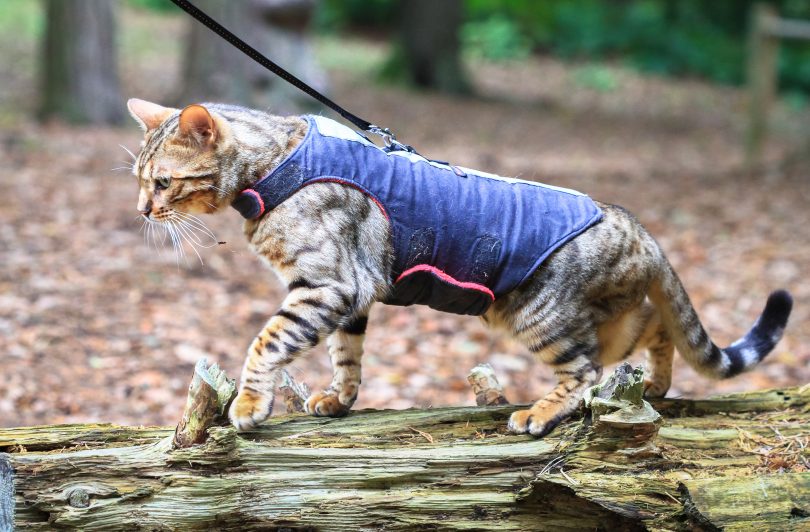
Minister for Transport and City Services Chris Steel (pictured with Simon Yates from the RSPCA and Alex Nickels from Domestic Animal Services) introduced the new cat legislation in the ACT Legislative Assembly in the first sitting week of 2022 . Photo: Lottie Twyford.
New cat containment and registration laws will come into effect in July. Thanks to changes to the legislation, felines living in containment suburbs will now be allowed to be taken for walks on leads.
The news has been welcomed by the RSPCA and Conservation Council, although the latter believes the containment zone should be expanded sooner and applied to more cats.
From 1 July this year, cat containment zones will be expanded across all of the ACT. But it will initially only apply to cats born after that date.
All other cats will continue to be allowed to roam unless they live in one of Canberra’s 17 declared cat containment suburbs.
Residents of these suburbs will now be permitted to walk their pet cats on leads.
Conservation Council ACT Region executive director Helen Oakey said the transitional approach taken by the ACT Government meant the current native population would continue to face threats from cats until it reached the end of its lifespan.

Furry felines will be able to be walked on leashes in cat containment zones thanks to a new bill introduced in the Legislative Assembly. Photo: Kevin Wells.
Ms Oakey urged the government to review the new laws after a year and implement a containment date for existing pet cats, too.
Minister for Transport and City Services Chris Steel said this approach for existing pet cats struck the right balance to allow a fair transition to the new rules for pet owners.
It’s still unclear whether the new laws will put an end to the government’s contentious trap, neuter, release program. Although Mr Steel said the preferred system was ‘trap, neuter, adopt’.
“We’ll be working with many of the care organisations that trap cats and try to move them to a position where we can see those cats adopted as much as possible,” he said.
Returning feral cats back to the wild is banned in most parts of Australia.
RSPCA animal care manager Simon Yates said there wasn’t a lot of local evidence to prove it worked well.
He’s hopeful the new laws will mean less work for the organisation but is cognisant this is a long-term plan, unlikely to deliver results for some time.
The government says the new rules will not only benefit native wildlife and the environment, but also the cats.
“Pet cats who roam live shorter lives on average and have higher rates of disease than those contained to the home,” Mr Steel said.
Under the new registration scheme – similar to what’s in place for dogs – cat details will need to be updated regularly.
Existing owners will be able to register their cat or cats for free while new owners after this date will pay a fee. It currently costs about $60 to register a dog for its lifetime.
“Introducing annual registration for cats will mean we can reunite lost cats with their families more quickly by having up-to-date contact details and will ensure better education and enforcement of responsible cat ownership,” Mr Steel said.
The new bill also introduces strict liability offences for pet owners who do not register their cats or keep them contained when required.
However, Mr Steel said people would not be punished for non-compliance during the transition period as the ACT Government took an educative approach to the registration and containment rules.
The July changes were foreshadowed last year when the government released its 10-year cat plan.
New suburbs will continue to be declared cat containment areas as they are built.












